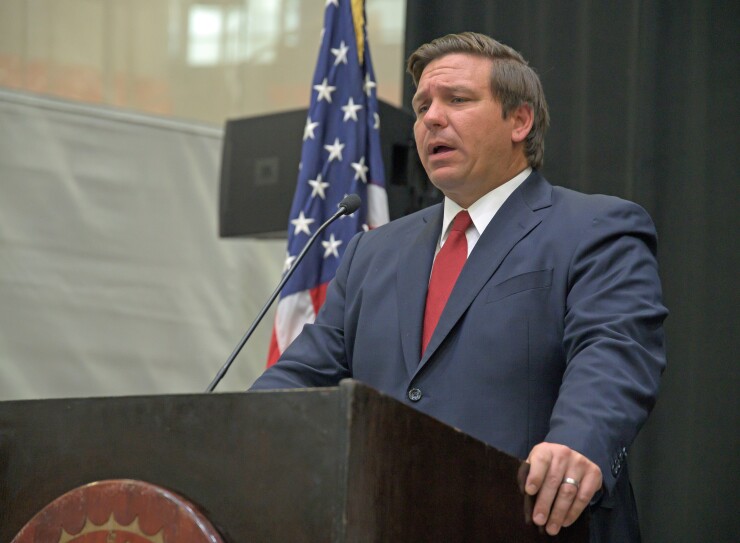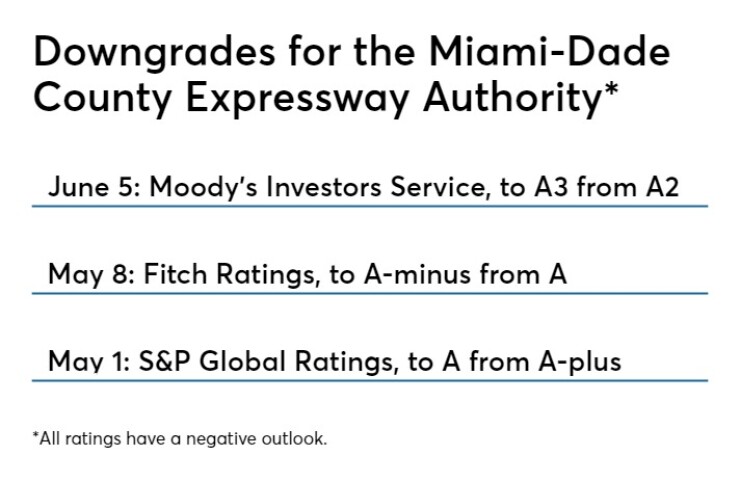The Miami-Dade County Expressway Authority survived a courtroom hearing this week when a Florida judge ruled that the authority can continue paying its bills, including payroll, for now.
Judge John C. Cooper said that while he didn’t want to run the expressway system, he wouldn’t allow it to fail and that the authority could continue writing checks on its accounts, even though it technically hasn’t existed since Gov. Ron DeSantis signed a law July 3 abolishing it.

Monday's hearing was the first of several to come in an ongoing legal battle over whether the state can repeal the law that created the Miami-Dade County Expressway Authority, also known as the MDX.
When DeSantis signed House Bill 385, the legislation immediately transferred the MDX’s assets and debts to the Greater Miami Expressway Agency, although most of its governing board has yet to be appointed.
According to HB 385, the new agency will have strict state oversight of its finances, including the issuance of bonds, unlike any other local toll road agency in Florida. The bill also requires the Greater Miami agency to have a goal of rebating driver’s toll collections up to 25% and it prohibits increasing tolls until 2029, if those are possible to do without violating covenants.
The bill was pushed by two Republican Miami-Dade County lawmakers, Sen. Manny Diaz and Rep. Bryan Avila, who disagreed with MDX’s toll policies.
Cooper was prompted to schedule Monday's hearing on short notice because the legislation didn’t include a plan to transition MDX’s powers immediately to the new nine-member governing board, which must be appointed by July 31. And the board’s first meeting won't be held until 15 days after that.
DeSantis, a Republican, made his three board appointments when he signed the bill, and a fourth member is the local secretary of the Florida Department of Transportation. Miami-Dade County commissioners and the Miami-Dade Transportation Planning Organization have yet to appoint their combined five board members.
The gap in governance led S&P Global Ratings on Tuesday to assign an A rating to the new Greater Miami Expressway Agency and to place the rating on CreditWatch with negative implications. It's the same rating S&P assigns to MDX debt.
“We are taking the rating action because of the absence of a transition plan detailing next steps such as operational and capital planning changes, including future borrowing plans, and other actions” planned by the new governing board, said analyst Kevin R. Archer.
Archer said the move to rate the new agency was prompted because the bill became law, and that he expects the CreditWatch status to be resolved in the next 90 days after S&P receives more details on the new agency's operational plans.
Moody's Investors Service went a step further two days after DeSantis signed the bill, downgrading its rating to A3 from A2 on MDX’s approximately $1.5 billion of outstanding bonds.
HB 385, analyst Myra Shankin said, materially changed the governance structure of the toll road system and “dramatically” reduced the new governing board’s ability to raise toll rates.
“The political climate that gave rise to this legislation suggests a lack of willingness to raise rates, even if allowed under the authority's powers,” Shankin said.
S&P, Moody’s and Fitch Ratings had already downgraded MDX’s ratings one notch each around the time the Legislature passed the bill in early May, citing unprecedented political interference into the operations of the independent toll road agency.
Fitch cut its rating to A-minus from A on May 8; Moody’s lowered its bond rating to A2 from A1 on May 10; and S&P downgraded the debt to A from A-plus on May 1.
"It is clear the entity has had its independent rate-setting authority compromised," Patricia Healy, Cumberland Advisors' senior vice president of research and portfolio manager, wrote in a credit commentary released Wednesday.
Less than two hours after HB 385 was signed, the MDX filed a motion requesting a preliminary injunction in an attempt to block the law from being enforced until an underlying lawsuit filed May 6 is settled. The motion says the injunction is necessary because the bill violates the state constitution prohibiting the Legislature from passing bills or special acts that only apply to Miami-Dade County, and it violates the state’s ban on impairing the contractual trust indentures for its bonds.
Cooper will hear arguments on the preliminary injunction in Tallahassee on July 25-26.
During the same hearing, he will also consider the FDOT’s motion to dismiss the lawsuit for failing to name the Miami-Dade County Commission as an “indispensable” party because MDX has argued that HB 385 violates the county’s home rule powers.
A third motion, filed by the governor’s office asking that the suit be dismissed, will also be heard. DeSantis has argued that the “foundational principle of separation of powers is under attack” by the MDX, and the sole authority to sign or veto legislation rests with him.
Both DeSantis and the FDOT on Monday filed amended motions to dismiss the MDX’s complaint, saying that it no longer has standing to file a lawsuit, because it was dissolved July 3.
In the underlying lawsuit, the MDX contends that HB 385 violates Miami-Dade County’s home rule charter, which enables the county to govern itself. The suit alleges that the measure impairs MDX’s contracts in violation of state law.
Miami-Dade County has been a home rule county since 1956, a status recognized in the state constitution that prevents the Legislature from passing bills that apply solely to the county, according to the complaint. The county commission created MDX as an independent special district in 1994.
The suit contends that the bill also violates a transfer agreement between MDX and FDOT, under which MDX purchased all rights and ownership of the five expressways it operates.
The FDOT, in a May 9 court filing, contended that MDX is an agency of the state of Florida. “This fact is also set forth in the transfer agreement’s preamble, which states MDX is an agency of the state, existing under the Florida Expressway Authority Act,” it said.

The Florida Expressway Authority Act was repealed when DeSantis signed HB 385 and created the Greater Miami Expressway Agency as a successor agency of the state.
The governor's three appointments to the new agency’s board are Koch Industries regional manager Fatima Perez, Key Biscayne attorney Marili Cancio, and Rodolfo Pages, who is a managing director for the private equity firm Caoba Capital Partners.
Local FDOT Secretary James Wolfe, who served on MDX’s governing board, also will be a voting member on the new agency’s board.
HB 385 requires that the Miami-Dade Transportation Planning Organization appoint three governing board members, while the Miami-Dade County Commission has two appointees. The deadline to make those is July 31, leaving a gap in oversight that Cooper resolved with his ruling on Monday.
The TPO meets Thursday, and its board will received a status update on the MDX. The agenda doesn’t indicate if appointments to the Greater Miami Expressway Agency will be discussed. The TPO had discussed appointing its members at a prior meeting, but that was before HB 385 became law.
The County Commission meets Tuesday, and chairwoman Audrey Edmonson has issued a memorandum requesting that commissioners submit nominees to the new agency and their resumes by Friday.
Edmonson, who also sits on the TPO, had previously questioned if volunteers would be willing to serve on the new board because they might get removed if local legislators believed they were not following the law when setting toll rates.





